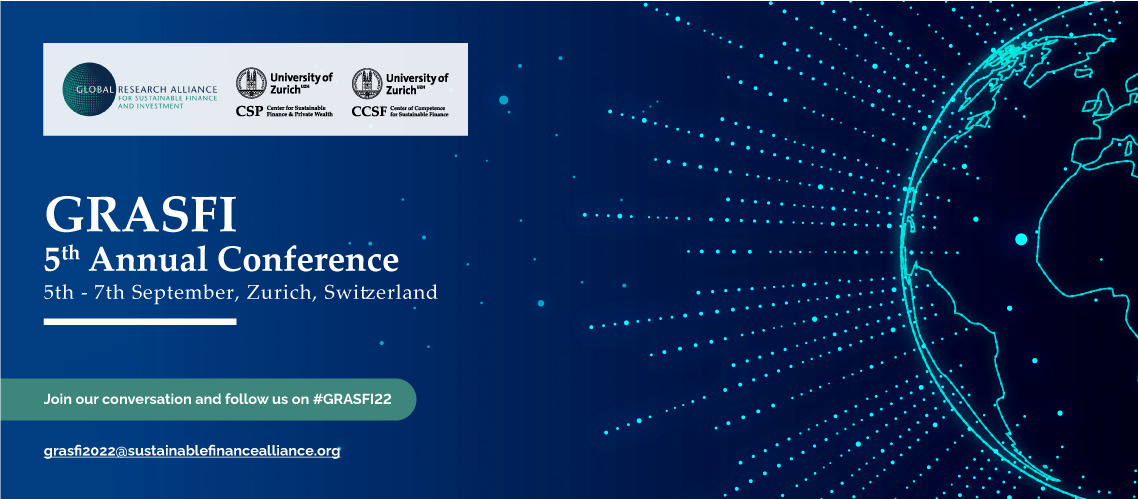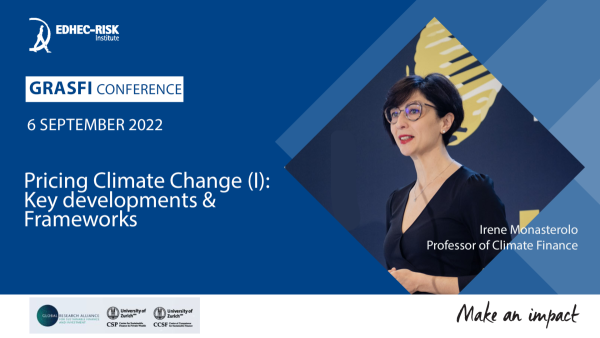5th Annual GRASFI Conference

Asset-Level Climate Physical Risk Assessment and Cascading Financial Losses
Presentation
On June 9 2020, the EDHEC Business School joined the Global Research Alliance for Sustainable Finance and Investment (GRASFI), the global network for cutting-edge research on sustainable finance and investment. The partnership underscores EDHEC’s commitment to this area, just a few weeks after presenting its new strategic plan – ‘Impact future generations 2025’ – and unveiling its strong ambitions in the sustainable finance field.
The Alliance fo Sustainable Investing was founded in 2017 to promote multi-disciplinary academic research on sustainable finance and investment. The Alliance is also developing academic collaboration among researchers working on sustainable finance and nurturing the growth and development of graduate students and junior academics working on these topics.
The 5th Annual GRASFI Conference is being hosted by the the Center for Sustainable Finance and Private Wealth (CSP) and the Center of Competence in Sustainable Finance (CCSF) at the University of Zurich. Located in Zuürich, Switzerland, the global heart of private wealth management and a major hub in the global banking and reinsurance business, GRASFI 2022 will benefit from its direct proximity to global finance research and practice.
Session Themes
- Data and Reporting
ESG metrics and ratings; Financial disclosure and reporting; Measuring climate-related factors; Spatial finance; AI and Big Data.
- Regulators, Regulation and Policy
The role of central banks and regulators; Political economy and sustainable finance; Sustainable finance and law; Effects of sustainable finance regulation.
- Stakeholders and Themes
Impact of sustainable investing on the real economy; (Ultra-) High net worth individuals, advisors, intermediaries; Behavioural aspects of sustainable investing; Investor preferences; (Re-)insurance; Banking; Sustainable investments (e.g. Private Equity, Lending, Blended Finance); Managerial responses to sustainable investing; Debt markets (social bonds, social impact bonds, green bonds); Faith-based investors.
- Finance, Society, and the Natural Environment
Biodiversity and nature; Adaptation and resilience; Sustainable sectors (water, agriculture, healthcare, infrastructure investment, etc.); Social and societal effects.
Agenda

On september 6, at 2:00pm, Irene Monasterolo, Professor of Climate Finance, EDHEC Business School, Programme Director (Impact of Finance on Climate Change Mitigation and Adaptation), EDHEC Risk Climate Impact Institute, will present her paper entitled "Asset-level climate physical risk assessment and cascading financial losses", co-written with Giacomo Bressan, Anja Duranovic (WU Vienna University of Economics and Business) and Stefano Battiston (University of Zurich - Department of Banking and Finance; Ca Foscari University of Venice).
Abstract: Authors develop a methodological framework for asset-level climate physical risk assessment that connects for the 1st time asset-level information (financial, extra-financial and climate), to firms’ revenues, macroeconomic dynamics, financial valuation and investor’s risk.
- They combine the acute and chronic impacts of climate change. Shocks on physical assets are translated into adjustments in the financial valuation of the equity contracts by means of a Climate Dividend Discount Model, and then into an adjustment of investors’ Expected Shortfall.
- They apply the methodology to the assessment of cascading risk for European investors who hold equities of firms that have assets located in Mexico and exposed to hurricanes.
Results confirm the importance of the asset-level approach for financial risk assessment. While expected annual impacts of chronic risk at sector level are generally low (-1.29% on average), important shocks emerge when we consider acute impacts on individual assets, and higher return periods (RP), reaching up to -13.07% for RP 250.In addition, the Expected Shortfall of the investor increases considerably up to -12.48% for RP 250. Thus, comprehensive asset-level physical risk assessment should be a main concern for investors and financial supervisors..
Keywords: eolocalized physical assets, climate physical risk, cascading losses, equity holdings, Climate Discount Dividend Model, expected shortfall.
You can access her latest keynote speech on the theme of "Cascading climate risks: an asset level financial approach" given at the 5th International Risks Forum was held in Paris, organized by the Louis Bachelier Institute.
You can dowload the full agenda of the 5th Annual Grasfi Conference or register directly online.
Irene Monasterolo, PhD, is Professor of Climate Finance at EDHEC Business School where she heads a research programme on climate stress tests and the evaluation of green finance initiatives.
She writes and researches on topics related to climate change and the financial system, including tail risk scenarios, climate stress test, and green finance policies and regulations. She has developed the climate stress test of the financial system and the EIRIN Stock-Flow Consistent model. Her research is published in leading journals such as Science. Prior to joining EDHEC, she held research positions at the Vienna University of Economics and Business, the International Institute for Applied Systems Analysis and Boston University. Irene also has extensive experience in mainstreaming research results into climate finance policy and risk management. She has collaborated with international and European leading financial institutions, including the World Bank, the European Central Bank, the G20, the European Insurance and Occupational Pension Authority. She is associate editor at Ecological Economics and research area leader for Environment-Economy Interactions at the EAEPE.


